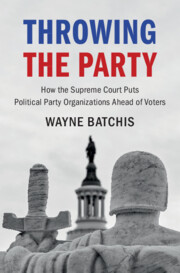Book contents
- Throwing the Party
- Cambridge Studies on Civil Rights and Civil Liberties
- Throwing the Party
- Copyright page
- Contents
- Preface
- Acknowledgments
- Part I Foundations
- Part II Party Primaries
- Part III The Party, the Court, and Campaign Finance Law
- 8 Party Speech through Money
- 9 An Ill-Fitting Party Campaign Finance Jurisprudence
- 10 Parties and the Current Campaign Finance Landscape
- Part IV Passé Equal Protection and a Way Forward
- Index
9 - An Ill-Fitting Party Campaign Finance Jurisprudence
from Part III - The Party, the Court, and Campaign Finance Law
Published online by Cambridge University Press: 16 June 2022
- Throwing the Party
- Cambridge Studies on Civil Rights and Civil Liberties
- Throwing the Party
- Copyright page
- Contents
- Preface
- Acknowledgments
- Part I Foundations
- Part II Party Primaries
- Part III The Party, the Court, and Campaign Finance Law
- 8 Party Speech through Money
- 9 An Ill-Fitting Party Campaign Finance Jurisprudence
- 10 Parties and the Current Campaign Finance Landscape
- Part IV Passé Equal Protection and a Way Forward
- Index
Summary
The previous chapter explained how FECA carved out a special rule for political parties: first, exempting them from the general limitations on both contributions and expenditures; second, replacing these limitations with a single restriction on expenditures (with a total limit that differed depending upon whether the expenditures were for a presidential campaign or for a member of Congress).1 One might imply from this conflation of expenditures and contributions that, when made by a political party, Congress saw little reason to distinguish between a contribution to a candidate and an expenditure supporting that candidate. After all, one might reasonably opine, a party’s candidates and the party itself are inextricably linked, if not one and the same. A party exists to get its candidates elected.
- Type
- Chapter
- Information
- Throwing the PartyHow the Supreme Court Puts Political Party Organizations Ahead of Voters, pp. 148 - 168Publisher: Cambridge University PressPrint publication year: 2022

